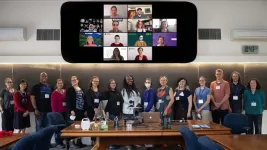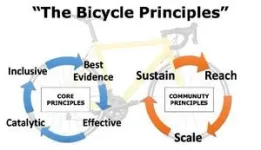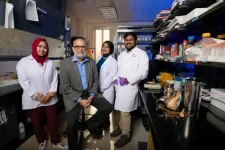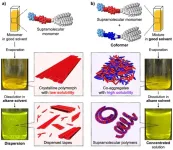(Press-News.org) Success in science, technology, engineering, and mathematics (STEM) demands keeping up with the latest tools and techniques. The AI boom, for example, has made coding and data management skills integral. But going back to school isn’t an option for most scientists. Short training programs like webinars and boot camps have become a popular alternative among busy STEM professionals. However, these formats can have significant shortcomings. There’s often no guarantee attendees will leave with the skills needed to advance their careers. And they can be exclusionary, preventing learners of all abilities and circumstances from benefiting equally.
“We’ve all had horrible teachers,” recalls Jason Williams. Williams is Assistant Director of Diversity and Research Readiness at the Cold Spring Harbor Laboratory (CSHL) DNA Learning Center. “There have been efforts to improve science education at the undergraduate level for decades. But there’s basically no effort to improve education once you’ve graduated. It’s just assumed you’ll somehow keep up.”
To tackle this problem, Williams and collaborators have created a new teaching framework called the “Bicycle Principles.” It aims to make short STEM training effective, inclusive, and scalable. The principles originated from a meeting at CSHL’s Banbury Center think tank. Williams and co-organizer Rochelle Tractenberg recruited the world’s leading experts in short-format education. They identified the field’s biggest issues and ways to address them.
The group came up with two sets of principles linked like bicycle wheels. One wheel, Core Principles, focuses on effectiveness and inclusivity. Recommendations here include setting clear objectives participants of all abilities can achieve. The other wheel, Community Principles, revolves around reach, accessibility, and sustainability. It recommends making training adaptable for different institutions, especially those lacking the resources of large universities.
Williams says the Banbury meeting and the guidelines it inspired are the first of their kind. He hopes they won’t be the last.
“If we can raise awareness, we can start doing something about it," says Williams. "Our goal was to put the first flag in the ground to say, ‘Here are the key problems scientists face in professional development. And here are some potential solutions.'”
Such improvements could help researchers achieve their career goals and increase the impact of their work—familiar objectives for Williams and CSHL. The institution supports a number of science career paths through its education initiatives. These begin as early as grade school via the DNA Learning Center. And they continue throughout a scientist’s career, with CSHL’s Meetings & Courses Program.
After all, learning is a journey. The Bicycle Principles can make the trip more successful for all.
END
CSHL rolls out STEM ‘Bicycle Principles’
2023-11-21
ELSE PRESS RELEASES FROM THIS DATE:
Coffee grounds may hold key to preventing neurodegenerative diseases
2023-11-21
EL PASO, Texas (Nov. 21, 2023) – Neurodegenerative disorders, including Alzheimer’s, Parkinson’s and Huntington’s, affect millions of people in the United States, and the cost of caring for people who live with these conditions adds up to hundreds of billions of dollars each year.
Now, researchers from The University of Texas at El Paso may potentially have found a solution in used coffee grounds — a material that is discarded from homes and businesses around the world every day.
A team led by Jyotish Kumar, a doctoral student in the Department of Chemistry and Biochemistry, and overseen by Mahesh ...
Gender stereotypes embedded in natural language
2023-11-21
Gender stereotypes harm people of both genders—and society more broadly—by steering and sometimes limiting people to behaviors, roles, and activities linked with their gender. Widely shared stereotypes include the assumption that men are more central to professional life while women are more central to domestic life. Other stereotypes link men with math and science and women with arts and liberal arts. Perhaps surprisingly, research has shown that countries with higher economic development, individualism, and gender-equality tend to also have more pronounced gender differences in several domains, ...
An effective approach for preparing supramolecular polymers at high concentration
2023-11-21
Supramolecular polymers (SPs) are molecular assemblies composed of non-covalently bonded small molecules. They show high recyclability originating from their dynamic nature of monomer binding, which is different from covalent polymers with non-biodegradable nature. The small repeating units that form SPs, called monomers, are specifically designed to construct multiple non-covalent bonds to enhance the stability of the resulting SPs. Such monomers can be organized into structurally distinct assemblies by forming various ...
Microautophagy is essential for preventing aging
2023-11-21
Osaka, Japan – To age or not to age! How does aging affect organisms on a cellular level? What mechanisms help cells survive self-inflicted or external harm? It is known that lysosomes—critically important cellular structures—are crucial for digesting damaged cellular components and pathogens, and maintain stability within cells and tissues. But can they also be repaired, and if so, how?
In a study published this month in EMBO Reports, researchers from Osaka University and Nara Medical University have shown that damaged lysosomes are repaired by a mechanism called “microautophagy” and have identified two key regulators of this ...
Mount Sinai Health System names Brendan Carr, MD, MA, MS, as next Chief Executive Officer
2023-11-21
Mount Sinai Health System announced that Brendan Carr, MD, MA, MS, a nationally recognized leader in academic medicine and health policy, will be its next Chief Executive Officer.
Dr. Carr joined Mount Sinai as its head of emergency medicine in February 2020, just before New York City became the initial epicenter of the COVID-19 pandemic in the United States. He played a critical role during the pandemic and led local, regional, and national initiatives focused on improving the Health System’s emergency and critical care capacity. He was ...
The Paul G. Allen Family Foundation awards $10.5 million to new Allen Distinguished Investigators
2023-11-21
SEATTLE, WASH.—November 21, 2023—Uncovering biological properties of extracellular vesicles, which play a vital role in how cells communicate, and understanding how sex hormones drive behavior and development are two areas that the new cohorts of Allen Distinguished Investigators will research, thanks to over $10 million in funding from the Paul G. Allen Family Foundation. The 18 researchers will develop technologies, design approaches, and uncover insights into fundamental areas of human biology.
2023 Allen Distinguished Investigators
Kenneth Witwer, ...
Novel AI system could diagnose autism much earlier
2023-11-21
CHICAGO – A newly developed artificial intelligence (AI) system that analyzes specialized MRIs of the brain accurately diagnosed children between the ages of 24 and 48 months with autism at a 98.5% accuracy rate, according to research being presented next week at the annual meeting of the Radiological Society of North America (RSNA).
Mohamed Khudri, B.Sc., a visiting research scholar at the University of Louisville in Kentucky, was part of a multi-disciplinary team that developed the three-stage system to analyze and classify diffusion tensor MRI (DT-MRI) of the brain. DT-MRI is a special technique that detects how water travels along white matter tracts in the brain.
“Our ...
MRI reveals brain activity behind fanaticism
2023-11-21
CHICAGO – Soccer fans exhibit different patterns of brain activation while watching a match that may trigger positive and negative emotions and behaviors, according to research being presented next week at the annual meeting of the Radiological Society of North America (RSNA). The researchers say the implication of these findings could extend beyond sports to fanaticism in other areas, such as politics.
“This study aims to shed light on the behaviors and dynamics associated with extreme rivalry, aggression and social affiliation within and between groups of fanatics,” said the study’s lead author, Francisco Zamorano ...
Computer simulation suggests mutant strains of COVID-19 emerged in response to human behavior
2023-11-21
Using artificial intelligence technology and mathematical modeling, a research group led by Nagoya University has revealed that human behavior, such as lockdowns and isolation measures, affect the evolution of new strains of COVID-19. SARS-CoV-2, the virus that causes COVID-19, developed to become more transmissible earlier in its lifecycle. The researcher’s findings, published in Nature Communications, provide new insights into the relationship between how people behave and disease-causing agents.
As with any other living organism, viruses evolve over time. Those with survival advantages become dominant in the gene pool. Many environmental factors ...
Babies as young as four months show signs of self-awareness - study
2023-11-21
Babies as young as four months old can make sense of how their bodies interact with the space around them, according to new research from the University of Birmingham.
The findings, published today (21 November 2023) in Scientific Reports, shed new light on how self-awareness develops.
Experts from the Birmingham BabyLab showed babies a ball on a screen moving towards or away from them. When the ball was closest to them on the screen, the babies were presented with a ‘touch’ (a small vibration) on their hands, whilst their brain activity was being measured. The data collection for the study was conducted at Goldsmiths (University of London).
The researchers ...











